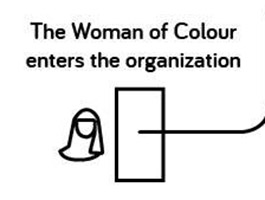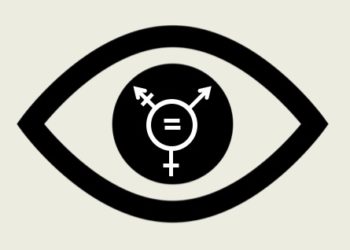Editor’s Note: Today’s post is by Tasha Mellins-Cohen. Tasha is the Director of Publishing for the Microbiology Society, and a member of the COUNTER Executive Committee and the UKSG Education Committee. Her industry expertise stretches from publishing operations and project management to policy setting, via technology management and business analysis.
“Officially, it’s because the other candidate was a better cultural fit for the organization. Unofficially, they think you are a maternity risk.”
That’s a direct quote from a recruitment consultant circa 2008, telling me that I’d not been offered a job. I can’t even begin to list all the problems in that statement, because there are just so damn many of them. My response to that recruitment consultant all those years ago was that (a) I didn’t want to work for such a bigoted company, and (b) I’m childfree by choice. Childfree, not childless: my life does not lack for children, they just don’t live in my house, eat my food, or require me to in any way be responsible. And by choice, not circumstance: I could have them, but have chosen not to after long and careful consideration of the options.

Let’s take a step back: I am privileged. My parents are hot on education, and pushed me to achieve my potential by sending me to a single-sex grammar school and encouraging me to obtain undergraduate and postgraduate degrees. I am white, middle class, and cis-gendered. I own property (okay, the bank owns it, but it’s my name on the deed) and have managed to pay off my student loans, credit cards, and car loans. Life is good! However, I can’t help but think that it would be easier, though not better, if I was a man – or if I stuck to the “Life Script”. You know, the one that goes school → university → job → marriage → babies. It’s not a bad script, it just doesn’t work for everyone. For example, while just 9% of English and Welsh women born in 1946 had no children, for those born in 1970 the proportion is 17%, and in Japan the proportion of women without children has risen from 11% for women born in 1953 to 27% for women born in 1970. The latest estimates are that one in five women in the US and Europe will enter menopause without having had a child. In many cases, higher educational attainment and higher income are associated with childlessness – the 2004 US Census, for instance, showed that nearly half of women with incomes over $100,000, and 25% of those aged between 40 and 44 who held a bachelor’s degree or higher qualification, were childless. We are a pretty significant minority, so in light of the recent amazing posts on The Scholarly Kitchen discussing diversity and inclusivity I feel it’s time to speak out for us.
I can’t begin to imagine how difficult it must be for colleagues who are from a minority background, or who feel that the community would not welcome their true selves: it’s been hard enough just being openly childfree. There was the woman who thought that I should give her my holiday allowance so that she could spend time with her children, because I must be a driven career woman who didn’t need a break, and with no outside interests or commitments. The man who tried to diagnose me with both fertility problems and a psychiatric disorder, because there must be something wrong with a woman who doesn’t want kids. The many people who have stated that I must be selfish, depriving my husband and our collective parents of a baby. The endless comments from condescending well-meaning individuals telling me that I will change my mind when I’m older are tapering off as I edge closer to 40, being replaced with questions as to who will care for me when I am old. For reference, when I’m old enough to need care it’ll come from nursing home staff, but as I won’t have spent hundreds of thousands of pounds on raising children, it’ll be a really good nursing home. There are plenty of other examples, but there is space only for one: the colleague who in all earnest explained to me that I would not be a “real woman” until I had borne children, becoming offended when, after fifteen minutes, I lost my patience and exclaimed that I wasn’t clear on why she thought that childbirth would make any change to my chromosomal make-up (I was considerably more profane at the time).
While it is utterly infuriating that adult women who’ve made a choice not to reproduce are generally held to be less mature, responsible, and sensible than their many compatriots who had children by accident or design, most of the time I treat people’s comments and attitude as a joke. I’ve developed my own form of conference bingo, which doesn’t include the things you might expect from business bingo – “thinking outside the box” certainly doesn’t show up – but does include things like “you’ll change your mind”, “it’s different when it’s your own”, “that’s so selfish”, and so on. For me, the best conferences are the ones where I don’t need to pull out the bingo card.
So why the blog post? Because I’m lucky: my childfree state is my choice, not something imposed upon me. When someone asks me whether I have children, and I reply that I don’t, the next question is almost always about why I don’t have them. The list of reasons is as long as my arm, and I choose whichever one seems most likely to cut off the conversation; “I’d probably leave it on the train” is a good one. But good grief, people! Can you imagine how hurtful that question must be to someone – anyone – who desperately wants to have children and can’t?
I showed this post to a good friend at an early draft stage, and she had this to say:
“Try being a single mother. I have been asked before how I would manage… my childcare is none of your business.”
You know, I can’t help but think that the world has us coming and going – whatever we choose to do, someone is going to think we’ve done the wrong thing. The moral of the story? Whatever your opinion might be, don’t give it unless you are invited to do so – and that includes asking intrusive questions. Let’s stop giving lip service to diversity and start practicing inclusivity instead.
Discussion
34 Thoughts on "Guest Post: Childfree, Childless, and Childcare – They All Attract Bias in the Workplace"
Thank you. This is a great post to draw on a serious problem. On a more meta-level it absolutely infuriates me that it is always women who are held accountable — for having children (surely you will be less devoted to this job, OR: surely you are a bad mother when you are in a top job, letting others care for your children, too); for not having children (see everything outlined above); for the make-up of the family (single/divorced mother, etc).
I know of few men — actually, I know none — who have been asked to account for such choices (but maybe I am being too pessimistic here).
Of course this is a larger, societal, issue, and one that will probably take at least a few decades to change, if at all. But calling out any such bias, in any industry, is surely a good place to start.
Great post, thanks Tasha.
Thank you Tasha for this post. I tell people I was unable to find suitable breeding stock and that is why I am Childfree. Ususally shuts them right up. 🙂
Love it! Thanks Gwen 🙂
Very well put, Tasha. An excellent and relevant post. Thank you for writing it.
Thank you for this post, Tasha. It captures the experience that many of us have had who don’t have children, for whatever reason, and I appreciate that it brings up another type of diversity. Having had awkward and uncomfortable interactions around this question with colleagues, I think this is an important issue to surface.
Many, many years ago, when I had just been appointed to a senior role, I was at the lunch before a board meeting and everyone wanted to get to know the new director. I was asked by one director about children (I was in my mid-thirties) and I said I didn’t want them. His response? “That’s strange; you look so feminine!” I was momentarily speechless – not an easy thing to achieve with me. I thought, just a bit too late, that I should have asked when he was last involved in a fistfight and then said, “That’s strange; you look so masculine.” On reflection, I’m glad I didn’t. His remark was made innocently, was ‘of his generation’ and he would have been mortified if I had pointed out its implications. He later became a super colleague that I had a good working relationship with and was a great supporter of mine. I’m glad I didn’t put that at risk. And I’ve dined out on it numerous times since!
I tell people I have more than 8,000 children, all, or mostly all, over the age of 18 that I have raised. They are my college students and it is getting more and more evident that I am by far more of a parent to some of them than the ones who birthed them.
Harvard Business Review just published an article “What Most Companies Get Wrong about Men and Women” by Catherine H. Tinsley and Robin J. Ely. It statistically refutes much of what is myth about why women with children cannot rise in the workplace. Great read. https://hbr.org/2018/05/what-most-people-get-wrong-about-men-and-women
Thanks Sandi, that’s a fab article
Well said!
Thank you for writing about this Tasha. It is amazing how many people don’t understand how insulting the question can be, along with all the condescending follow-up comments. “Oh, you’ll change your mind…” was the most annoying one from my younger years, and “having children is the most rewarding experience a woman can possibly have” is the one that’s most annoying now because the implication is that I have blown my chance at “real” womanhood. And in my experience it has usually been women who question me about my choice, not men.
Thank you for this! Well said.
You are so right that we women are damned if we do, damned if we don’t when it comes to having children and parenting them. There was some commentary this morning on National Public Radio in the U.S. about how Senator Tammy Duckworth made history first by being the first senator to give birth while in office, and then by bringing her newborn to the Senate floor for a vote two days later. The person being interviewed opined, aptly, that the true change would come when it was a man bringing his baby to the Senate because his wife had an important meeting and childcare arrangements had fallen through – something I think is a long way off. Similarly, no one asks men why they don’t have kids, or question their masculinity or motivations when they say they don’t want them. Women shoulder more of the burden of parenting and they also get criticized more for not parenting (by choice or otherwise).
Wonderful post! Thank you for bringing this topic into the light.
Thanks so much Tasha for writing this post! I was childless for years out of choice, had a difficult path having a child later in life but still it was my choice! I lost on job opportunities being a women from a visible minority group as I couldn’t get over the shame of not having kids at a young age! It broke me that so many of my peers were on the “right path” to their careers while I chose to stop and pause and have children late.
I wish, in general, people would just stop with the intrusive questions, period. It seems every stage of life has ridiculous people doing this: do you have a boyfriend, why not? Are you married? why not? Why aren’t you married? When are you going to have kids? When are you going to have another one? and on and on. Are you going to try for a girl? What, only girls? Where are you from? How long have you been here? plus yours, Tasha. I chose to have one child. I can’t tell you the number of times people have said to me, oh, well, you have it easy, you only have one. Or my favorite, oh is she your ONLY child? I refuse to use that word “only”. I always respond and say “yes, I have a daughter” or I might say “who says I only have one?” (counting my ex-husband in that remark). I was at my sister-in-laws wedding reception, and struck up a conversation with another guest, and when I said I had one child to his question, he literally just turned and walked away without another word! The bottom line is every life stage has challenges and these questions are just plain rude. The upside is that they won’t last forever. Could I have adopted or gone the donor egg route? Maybe, but when we reached the five-figure money level, we decided bankrupting my family was not a good idea. And now? My kid is finishing college and we’re laughing all the way to the bank compared to our friends who had 3 or 4 kids and now suddenly have to figure out how to pay for them all to go. When we made our decision, I was glad we were brave and had the courage to buck the societal norm, rather than do ANYTHING to appear to “fit in” with the rest of society. And I’m proud of myself for that, and you should be too. It takes guts to do something outside of what everyone else thinks you should do. So, you should give yourself a pat on the back. If someone asks you why again, I’d just say with a huge smile on my face, “oh wow, that’s a really personal question!”
Great post! I made the same choice as you. Part of my reasoning was “I’d rather be at the end of my life wishing I had had kids than be at any point in my child’s life wishing I hadn’t.” And I know more than a few people who sometimes seem that they wish they weren’t parents. (I’m over 60 now and have no regrets.)
Great post, Tasha.
We need to talk about things that are untalkable to raise awareness. Thank you for sharing and initiating this discussion.
We have 7.6 billion people on the planet, with 50% of the population living on less food than what they need to stay nourished. By 2050, the population is going to 9.6B, which means more burden on the planet and large section of the population barely living like human beings.
I believe even when faced with career bias, societal shame and peer pressure, I find women who are choosing to be childfree, are doing something wonderful for the world. This is a blessing. Kudos to them.
As a 28 year old man i do get asked why I don’t want kids and yes people tell me I’ll change my mind.
Indeed, intrustive questions in the workplace should be avoided. But I feel that the difference is that as a 28 year old woman I was actually told I was a “maternity risk” and missed out on promotion as a result. This doesn’t happen to 28 year old men.
That goes beyond intrusive; that type of comment is illegal. It is called sexual harassment. Unfortunately, the burden of proof is still on the victim who must document usually multiple incidences like this, must protest when it happens, and may have to find witnesses to testify if it goes to court. Sexual harassment isn’t just about sex; it’s also about being harassed because of your sex, ie woman. It’s about your workplace being a hostile environment to you, as a woman. It astounds me that so few people I talk to don’t understand or know there is a law on the books that makes sexual harassment a crime. Heavy burden of proof, sure, but still a crime punishable by the law.
Thank you all very much for the comments, and for sharing your stories!
My sister said years ago that she didn’t want children and it was the right choice for her. I had 2 sons after I was 35, which was right for me. They use my husband’s last name while I don’t, so I got asked if they were “really mine” sometimes. I am trying to bite my tongue about my sons’ desires to have children or not, much less not to ask my daughter-in-law if she is “trying”. We can model the way we want others to treat us, including catching ourselves before we ask those nosy questions of others.
Well said. As a 39 year old woman in an office full of people around trying see age, I have noticed that I get a hard time for time off just because I want to and no one blinks an eye when someone needs to take some time for a child-related issue.
It is an extremely unfair double standard in the workplace. I had to have an attendance conversation with a woman I knew had a childcare issue. As her manager I had a staffing issue – it was her frequent absences.
I chose to be sterilized at age 28. This was 43 years ago. I have never regretted my decision. At that time, I was directed to see a psychiatrist to ensure that I was not crazy. I hope this has changed for women who wish to remain childfree. I’ve had an interesting and varied life, and since turning 40, have been on a spiritual path that has been very rewarding. The crap that other women have tried to dish out for me under the banner of “for my own good” is often a reflection of their own u happy lives. I appreciate this blog. There was no support for me when I made this decision 43 years ago. I’m pleased to see that things are slowly changing.
Sadly not; I’ve been turned down repeatedly for sterilisation because (in a spectacular display of medical paternalism) “you’ll change your mind”
Nope, it has not changed 🙁 In 2009, I had been married for several years, and my husband and I knew we did not want children…ever. My female PCP at the time wouldn’t address my questions about sterilization. She referred me to a family planning clinic. The female doctor I saw at the clinic told me that I was too young to make such a decision (I was 30). She even asked me “DOES YOUR HUSBAND KNOW?!?” As if I was making this decision in secret, behind his back. She also refused to give me an IUD, saying that she couldn’t, in good faith, give a woman who had never had children an IUD because of the risks involved. Just an FYI…this all occurred in Boston, a place people think of as terribly liberal. Sigh… My husband called his doctor just a week later, got a referral to a urologist who scheduled a vasectomy for him not too long after. It cost us an office visit co-pay. That’s right folks, $20 and no one told him he was too young or assumed he was shamming his wife. It’s sad.
That being said, at 40, people still ask all the time when my husband and I are going to “start trying.” When people persist and won’t take a polite hint, or even blunt answers such as “I’m not comfortable talking about my fertility with strangers,” I go bold. I will tell them that a uterus unfortunately isn’t part of the sex change operation. Or say that I don’t want any of my potential children to be friends with their children. Those answers work surprisingly well.
Very honest post – and you’ve covered a very topical and important issue with frankness and without apology. Thank you Tasha.
I am a man and when people find out I am married I have been asked why I don’t have kids loads of times! “The world is overpopulated already” is a good one. Have you tried it, Tasha?
I have, and the counterpart “no matter what I do, my environmental footprint will be smaller than yours, as I’ve not had kids”!
What a terrific and timely article, with the current focus on things like harassment and gender pay gaps in the workplace. I am one of those who DID end up changing their mind in later life about kids, but life is certainly no easier if you do have them. You are a “breeder” now, not career focussed! And the questions now are “are you going to give it up to stay at home with the children? No? Why did you have then then?” Perhaps one day this will resolve…
Excellent post Tasha, thank you!
Somewhat related note that came to mind as I read through the post and comments. Some years ago as my daughter was pending her arrival on the scene, I put in for eight weeks of paternity leave with my employer, only to encounter a great deal of push back on why a man would possibly need to take paternity leave at all. My manager suggested that a max of two weeks should be perfectly satisfactory. Fortunately, the FMLA had been just signed into law in the US, giving me an opportunity to suggest that eight weeks would be most workable and they should be glad I wasn’t asking for the full 12 weeks allowed me under the law. And all this for *unpaid* time off!
Why oh why, as a society, must we insist that everyone adhere to the same norms, in gender roles, in family life, in sexuality, in most everything? Variety is the spice of this whole thing we call life and embracing diversity and the unique ways in which all of us can be our most effective human selves should be paramount in our interactions with one another.
Thanks for this post Tasha. It struck a chord with me. Usually I just say “no” when asked if I have children but I feel that a further explanation is expected. Especially after a colleague once remarked after I’d recalled a weekend spent with a friend’s family: “Oh, I thought you didn’t like children”!
I also sometimes feel guiltily frustrated when the very positive events put on to promote women’s career progression focus on childcare and returning to work. These are very important but not relevant to me. So instead I come away feeling a bit inadequate – I’ve not had to take a career break or felt a need to go part-time surely I should be CEO by now!
On the children question, I suppose that, while personal, it is also just an easy non-work question to break the ice and make a connection with new acquaintances. We all have lives beyond work – hobbies, sports, community activities, politics, caring for family, friends and neighbours – so maybe we need to think of some other shorthand questions to help us find out more and get to know each other better. Who knows what else we might discover about each other!?
Thanks for this post! One note: a post on diversity would do well not to limit womanhood to limited definitions based on “chromosomal make-up.” Women who are trans are just as real as cis women.



